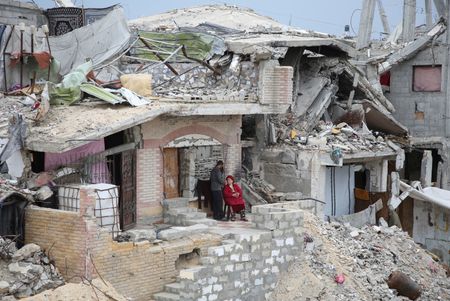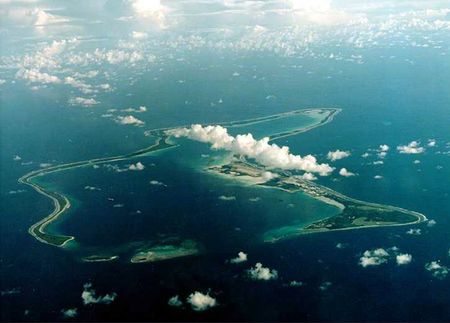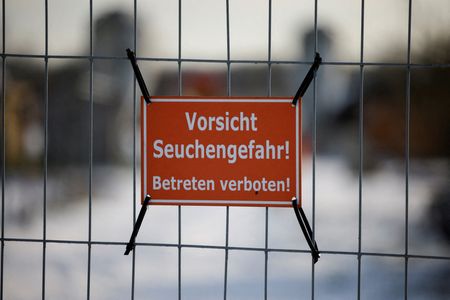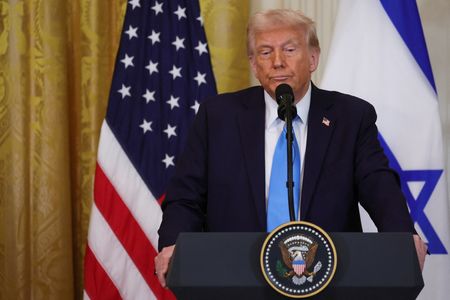By Steve Holland, Matt Spetalnick, Jeff Mason and John Irish
WASHINGTON/PARIS (Reuters) -President Donald Trump’s plan for the U.S. to take over war-torn Gaza and create a “Riviera of the Middle East” after resettling Palestinians elsewhere has shattered U.S. policy on the Israeli-Palestinian conflict and sparked widespread criticism.
The shock move from Trump, a former New York property developer, was swiftly condemned by international powers, with regional heavyweight Saudi Arabia, which Trump hopes will establish ties with Israel, rejecting the plan outright.
Turkey called the proposal “unacceptable” and France said it risked destabilising the Middle East.
Countries from Russia, China, Germany, Spain, Ireland and the UK said they continued to support the two-state solution that has formed the basis of Washington’s policy in the region for decades, which has held that Gaza would be part of a future Palestinian state that includes the occupied West Bank.
Trump, in his first major Middle East policy announcement, said he envisioned building a resort where international communities could live in harmony after over 15 months of Israeli bombardment devastated the tiny coastal enclave and killed more than 47,000 people, by Palestinian tallies.
Trump’s son-in-law and former aide, Jared Kushner, last year described Gaza as “valuable” waterfront property.
Welcoming Israeli Prime Minister Benjamin Netanyahu to the White House on Tuesday, Trump said he would support an effort to permanently resettle Palestinians from Gaza to places where they can live without fear of violence, and he and his team had been discussing this possibility with Jordan, Egypt and other regional countries.
In a news conference, Trump said Jordan’s King Abdullah and Egyptian President Abdel Fattah al-Sisi would come around to the idea despite their rejections, saying they will “open their hearts and will give us the kind of land that we need to get this done and people can live in harmony and in peace.”
The casual proposal sent diplomatic shockwaves across the Middle East and around the globe. China said it opposed the forced transfer of Palestinians.
“China has always believed that Palestinians governing Palestine is the basic principle of post-conflict governance,” China’s Foreign Ministry spokesperson Lin Jian said, adding Beijing backs a two-state solution in the region.
Some of the toughest criticism came from France, which said the forced displacement of Gazans would be a serious violation of international law, an attack on the legitimate aspirations of the Palestinians and destabilise the region.
An official from Palestinian militant group Hamas, which ruled the Gaza Strip before fighting Israel in a brutal war there, said Trump’s statement about taking over the enclave was “ridiculous and absurd”.
“Any ideas of this kind are capable of igniting the region,” Sami Abu Zuhri told Reuters, saying Hamas remains committed to the ceasefire accord with Israel and “ensuring the success of the negotiation in the second phase”.
It is not clear whether Trump will go ahead with his controversial plan or is simply taking an extreme position as a bargaining strategy. He provided no specifics at the news conference.
PERMANENT DISPLACEMENT
Russia believes a settlement in the Middle East is only possible on the basis of a two-state solution, the Kremlin said on Wednesday, while Spain’s Foreign Minister Jose Manuel Albares said “Gaza is the land of Gazan Palestinians and they must stay in Gaza”.
Earlier on Tuesday Trump called for the permanent resettlement of more than two million Palestinians to neighbouring countries from Gaza, which the U.N. estimates could take up to 21 years to rebuild.
A U.N. damage assessment released in January estimated there is more than 50 million tonnes of rubble left in Gaza.
Trump’s proposal raises questions whether Middle East power Saudi Arabia would be willing to join a renewed U.S.-brokered push for a historic normalisation of relations with U.S. ally Israel.
Saudi Arabia, a key U.S. ally, said it would not establish ties with Israel without the creation of a Palestinian state, contradicting Trump’s claim that Riyadh was not demanding a Palestinian homeland.
Saudi Crown Prince Mohammed bin Salman has affirmed the kingdom’s position in “a clear and explicit manner” that does not allow for any interpretation under any circumstances, the statement said.
Trump would like Saudi Arabia to follow in the footsteps of the United Arab Emirates, a Middle East trade and business hub, and Bahrain which signed the so-called Abraham Accords in 2020 and normalised ties with Israel.
In doing so, they became the first Arab states in a quarter century to break a longstanding taboo.
Trump said that he plans to visit Gaza, Israel and Saudi Arabia, but did not say when he plans to go.
Michael Milshtein, a former intelligence officer and one of Israel’s leading specialists on Hamas, said Trump’s comments put Israel on a collision course with its Arab neighbours.
“Maybe Trump is trying to promote pressure on the Arab states (so) that they will not create any obstacles if he will try to promote a normalisation between Saudi Arabia and Israel,” he said.
Netanyahu would not be drawn into discussing the proposal, other than to praise Trump for trying a new approach.
PALESTINIANS FEAR ANOTHER ‘NAKBA’
Displacement is a highly sensitive issue among both Palestinians and Arab countries.
As fighting raged in the Gaza war, Palestinians feared they would suffer from another “Nakba”, or catastrophe, referring to the time when hundreds of thousands were dispossessed of their homes in the 1948 war at the birth of the state of Israel.
“Trump can go to hell, with his ideas, with his money, and with his beliefs. We are going nowhere. We are not some of his assets,” Samir Abu Basil, 40, a father of five from Gaza City,
told Reuters via a chat app.
“The easier for him if he wants to resolve this conflict is to take the Israelis and put them in one of the states there. They are the strangers and not the Palestinians. We are the owner of the land.”
(Reporting by Nidal Al-Mughrabi and Colleen Howe in Beijing; Additional reporting by Gleb Stolyarov and Mark Trevelyan; Writing by Michael Georgy; Editing by Himani Sarkar, Michael Perry, Toby Chopra and Sharon Singleton)












